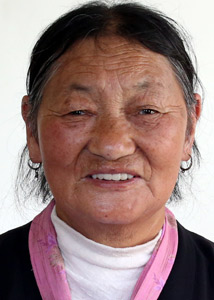Name: Dolma
(Alias: Yes)
Gender: Female
Interview Age: 74
Date of Birth: 1941
Birthplace: Morong - Sokzong, Kham, Tibet
Year Left Tibet: 1983
Profession: Farming, Herding
Monk/Nun: No
Political Prisoner: No

Interview No.: 7N
Date: 2015-04-08
Language: Tibetan
Location: Kathmandu, Bagmati, Nepal
Categories: Culture and History
Keywords: childhood memories, children's games, Chinese -- oppression under, Chinese rule -- life under, clothing/weaving, customs/traditions, festivals, herding, Kham, monasteries -- destruction of , songs/opera
Summary:
Dolma was born in Morong in Kham into a samadok 'farmers and herders' family. She describes the self-sufficient life that they led; the farm and animals provided them with food and clothing. She says that yak hair; sheepskin and wool were used to make belts, shoes, bags, clothes and tents. Milk products were bartered for grains within the community if needed. Only salt was sought from outside of the village.
Dolma enjoyed playing with other children while grazing animals during summertime but winter was difficult with rain and snow. She gives us an account of the Losar 'Tibetan New Year' celebration, an occasion of singing and dancing for 10 days. Dolma enjoyed participating in the game of pugyuk 'children running' when all the children under age 15 visited each village family to receive special treats. Dolma also recalls watching cham 'religious dance performance by monks' and sings a song about the hills surrounding her hometown.
Dolma married at age 22 and had one son. After the Chinese invasion villagers were denied religious freedom and forced to destroy the monasteries. She recounts that even a devotional butter lamp could not be lit nor could one be seen with rosary beads in hand.
Interview Team:
- Marcella Adamski (Interviewer)
- Palden Tsering (Interpreter)
- Dhiraj Kafle (Videographer)

